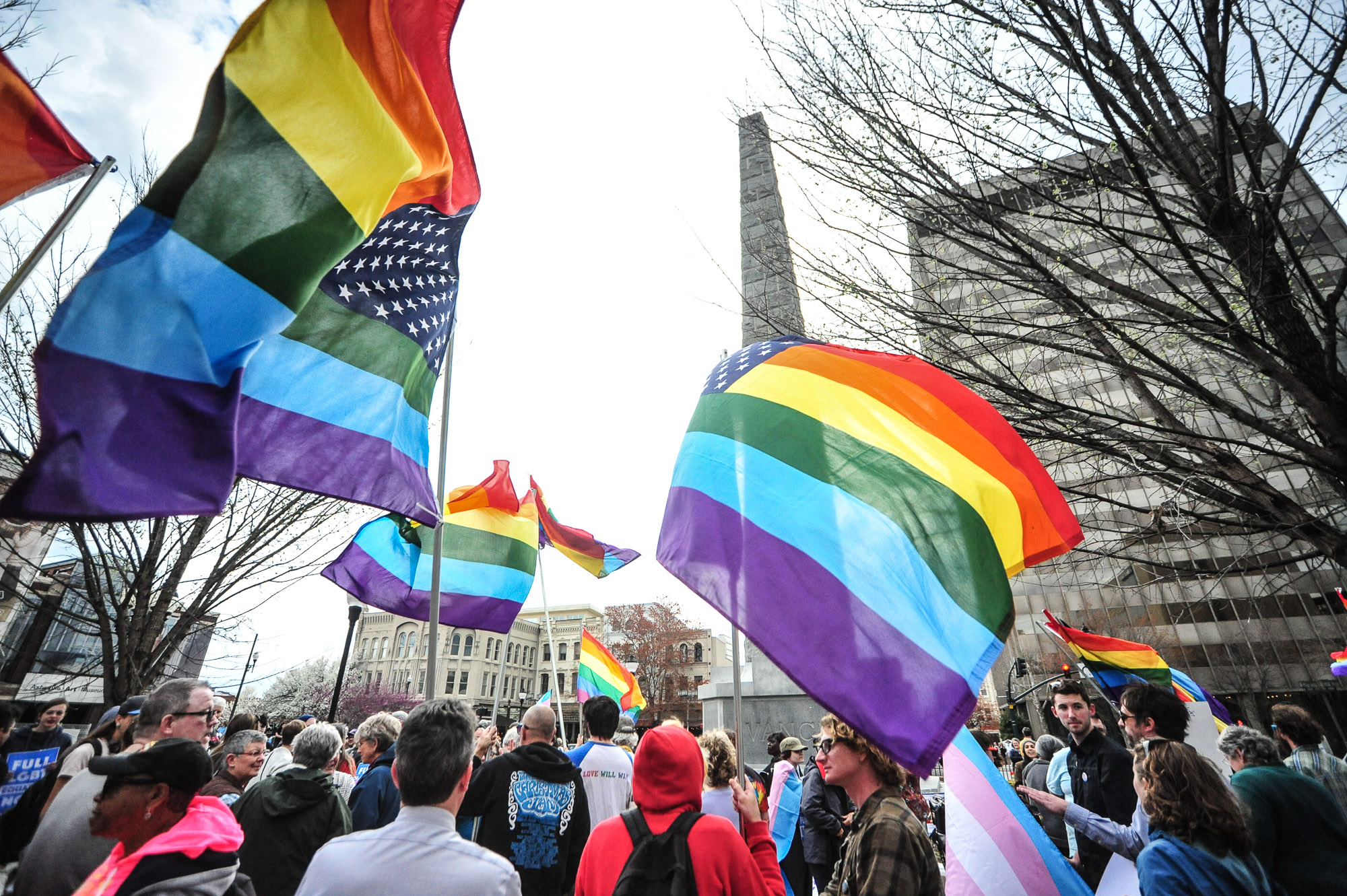


The Asheville Blade covered a lot of ground as we fought through a tumultuous, trying, important and groundbreaking 2016 alongside the people of the city we love
Above: Fireworks over City Hall. Photo by Bill Rhodes.
Well that was a hell of a year.
As 2016 (finally!) meets its end tonight, Ashevillians look back on a trying, confounding, fascinating and horrifying year. I hope that many of you endured, and are ready to lay the groundwork for better in 2017.
This was, after all, the year that legislators in Raleigh made the name of our diverse battleground state a national byword for bigotry, the year Asheville (almost) got gerrymandered, a year of major political fights inside and outside of City Hall, the year Trump came (and bolted from) downtown as a large crowd of Ashevillians declared their absolute opposition, the year of three elections, the year fault lines around racial justice, law enforcement, affordable housing, tourism and more were increasingly laid bare.
Through it all, the Asheville Blade sought to bring in-depth reporting, keen analysis and sharp perspectives to the people of the city. We were able to do this because more of you than ever before are supporting us with subscriptions and donations. Thank you. If this year proved anything, it’s that independent journalism is more important than ever.
We started off 2016 with a call for Ashevillians to use their right to talk about their pay, something more important than ever given the endemically low wages in our city. Then we delved into a majority of Asheville City Council setting a “McKibbon standard” for new hotels even as information about a living wage for most of the hotel’s workers remained elusive.
With all those questions swirling, we rounded up local perspectives on a changing downtown, what the downtown revival ignored (at its peril) and what might still save Asheville’s unique cultures from gentrification and desperation. Council banned “the box” as transit activists pushed for better bus service just before its annual retreat saw clashes with staff and splits about major issues.
While Charlotte passed extensive LGBT protections, Council remained hesitant and eventually balked. The March primary saw some shake-ups on the local political front and revealed both the enthusiasm that made Asheville Sanders country and the campaign mis-steps that still didn’t marshal the area’s strength.
HB2 hit, the local far-right spouted bigotry, many locals expressed their opposition to the infamous law and we looked at how we got here.

Opponents of HB2, gathering on March 24 to express their opposition to the bill. Photos by Bill Rhodes.
A Hall Fletcher parent and local activist wrote about issues with major changes and a lack of transparency at a key part of Asheville’s schools. Council mulled over the budget, hiked some fees and condemned HB2. I criticized City Attorney Robin Currin, who has repeatedly taken stances against basic transparency and open records without serious pushback from Council.
The city and the housing authority moved forward with the Lee Walker Heights overhaul and we took a look at the complicated history of power, poverty and race behind the project and the fights over the future of public housing. I emphasized that we are a city of renters and that too many local government debates revolve around the concerns of property owners, leaving out half the city. Tensions escalated over Airbnb-style rentals as Council (narrowly) agreed to keep current restrictions in place.
We provided a breakdown of the city’s $161 million budget. In a major collaborative project with the Asheville Citizen-Times, we took a look at the make-up of the city’s boards and commissions, revealing that this key part of government was far wealthier, whiter and more male than the citizens of the city they are supposed to represent.
As the summer wound on, Council reluctantly approved a developer’s relocation deal and set the stage for upcoming conflicts. Locals fought to save Elmer Reynoso from deportation and re-unite him with his family. Buskers asserted that city staff had not dealt with them in good faith or taken their concerns seriously. Terpsicorps mounted a production centered on trans people without their involvement or aid and columnist Brynn Estelle raked them over the coals for it.
A state legislator tried a last-minute gerrymandering of Asheville’s local elections and we looked into the history and political forces behind the idea. We investigated how the process to consider new management for Asheville’s transit system fell apart amid withheld information, major questions, dueling committees and ongoing problems.
On July 2, an APD officer shot and killed Jerry Williams. The death collided with years, even decades of tensions over racial justice and law enforcement in Asheville and we looked at the forces behind a time of tension that rocked the city to its core.
Council wound through an array of issues during its summer days. The first bond votes in over a decade made its way to city voters and we looked at the political wrangling behind the supposed attempt to deal with long-running problems as Council moved the bonds ahead.
Longtime political worker Aaron Sarver analyzed state legislature races through WNC. As Asheville’s leaders increasingly turned to the wealthy to solve the affordable housing crisis, I wrote that excluding those most affected while giving leadership to those who profited or caused the crisis was a really bad idea.
We took an in-depth look at the harsh response by some within the APD to this summer’s protests, finding that Chief Hooper and other leaders had opted for an approach marked by petty retaliation, contempt for civil liberties and repeatedly shifting explanations.
Trump showed up to Asheville, and bolted early as hundreds of locals turned up to face his supporters, a moment we highlighted with Max Cooper’s gripping photographs.

Protesters and police outside the Civic Center entrance during the Sept. 12 Trump rally. Photo by Max Cooper.
Meanwhile, reporter Leigh Cowart delved into Council clashes over everything from drug enforcement to the interstate. The city’s leaders, without much fanfare, changed a major piece of how they deal with downtown development and provided a primer on the bond referendum and the commissioners’ race.
As election day approached, a backlash against city staff grew and local unions launched a new push to get out the vote.
As the news from election day hit, I wrote that the country hadn’t gone crazy, the mask had just come off, and that realizing our greatest strength is each other is more necessary than ever. It’s time for Asheville to “Survive. Organize. Resist.”
In an in-depth election analysis we looked at what happened locally and re-committed the Blade to absolute opposition to bigotry and anyone that supports it. One reason hate maintains a foothold in our society is media refusal to treat it bluntly as what it is. The Blade does not follow that course and never will.
As the end of the year approached, I wrote a humorous look at a not-at-all-cluelessly awful Black Friday promotional video and the issues about segregation its problems revealed. Al Whiteside was chosen the first black Buncombe County commissioner, and Max Cooper chronicled the important moment in local political history.

Al Whitesides, Buncombe’s first African-American commissioner, applauded by local Democrats at his Dec. 5 election. Photo by Max Cooper.
As local government geared up to close the year, Sarver analyzed what was ahead for county politics. We unveiled a major investigative project, using over a year of city records to compile a map of how the city’s enforcement of its ban on Airbnb-style rentals in many neighborhoods was going. It provided a key look at who was profiting from the controversial industry, how much property they held, what prices they were charging and more.
Readers, I’m glad the end of this year finds you a survivor. I hope you are getting the support you need and that 2017 sees you well, tenacious and ready to fight. We’re not going anywhere.
—
The Asheville Blade is entirely funded by its readers. If you like what we do, donate directly to us on Patreon or make a one-time gift to support our work. Questions? Comments? Email us.